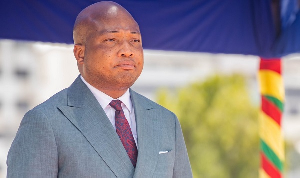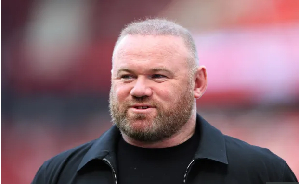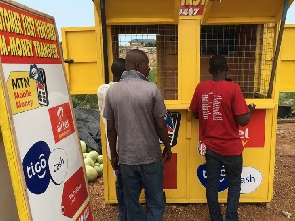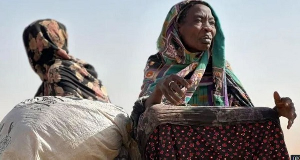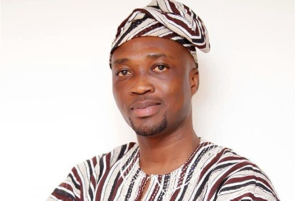By Kwame Okoampa-Ahoofe, Jr., Ph.D.
I surely would have loved to have had this piece published in the Ghanaian Times, at least the online version of the government-owned daily that bills itself, arguably, as “Ghana’s Most Authoritative Newspaper.” But I know fully well that this “horse wish,” so to say, is unlikely to happen in the offing. It is unlikely to happen because nearly three, or so, years ago, the Times’ online editor, Mr. Douglas Akwasi Owusu, after having published several of my articles (a few of them even accompanied by my portrait, at the urging of the Times’ online editor himself), made a request that I personally found to be rather profoundly unprofessional and a bit repugnant. Factor in the fact that I wasn’t being paid for my articles and, perhaps, the reader would appreciate the reason for my total disgust.
I was not going to take up this matter with the reading public, not at least for another lengthy while, except for the appearance of an article published by the Times with an identical thematic caption as the present one, which caused me to sit up and rethink this diplomatic bid to morally indefensibly continuing to shield a self-centered grub, at least in my personal opinion, who ought not to be working for a publicly own institution in his capacity as editor, by the very virtue of which position of public trust decisions appear to be taken, more or less, based on who is willing to handsomely pay for being “cursed” with the patriotic bug of wanting to seriously partake of the vital discourse on national development from abroad.
I would, of course, not fulfill Mr. Owusu’s request (though one can be quite certain that he was able to have his way with some more desperate and publicity-hungry souls), not necessarily for the two foregoing reasons, but primarily because knowing what I do know about the proverbial average Ghanaian temperament and attitude towards us “beentos,” I readily then surmised that if Mr. Owusu could so brazenly and facilely make such a quite expensive request of a total stranger, then it almost stood to reason to fairly conclude that the online editor of the Ghanaian Times likely had made similar calculated and outright mischievous requests of other Ghanaians living abroad who have eagerly contributed articles and write-ups to his newspaper.
I would shortly turn out to have been dead-on accurate in my surmise and assessment of the man, when I serendipitously compared notes with a relatively young fellow Ghanaian journalist recently arrived from Ghana as a designated media attaché to the Ghana Embassy in Washington, DC. Actually, I hadn’t attempted to compare notes with this gentleman, a sometime staunch operative of the then-ruling New Patriotic Party (NPP), at all; I had simply made a passing reference to the fact of my having published several articles in the Ghanaian Times and added that I had lately encountered what veritably seemed like a stonewall as, all of a sudden, the Times’ online editor, who had earlier on found my articles to be quite refreshingly thought-provoking, was no longer publishing them. To the preceding observation, my press attaché acquaintance sneeringly snapped, “That is Douglas alright. He probably demanded a laptop and didn’t get any from you.” I nodded knowingly and cursed under my breath: “That bloody SOB; he probably thinks laptops grow on trees here in America.” And even if, indeed, laptops did grow on trees hereabouts, didn’t one, first, have to own a piece of land in order to be able to plant that laptop-producing tree before gaining access to the same?”
I don’t even remember how such sonic free association came about but, in the telling at the time, I also thought about a lapdog. Which was rather funny, for ever since a puppy snipped at the heels of my kid cousin, Kurt Sintim-Bromley, I haven’t found either the courage or affection for the canine species, though growing up with my maternal grandparents, we kept quite a slew of spaniels and poodles in our courtyard. About the only times I remember wishing that we owned no dogs at all, were those tenebrous moments when one of “man’s best friend” took seriously ill and expired (usually that was a relatively long process spanning several days) and I had to conduct them, mournfully, to the land of the dead. I would invariably pick up a battered old King James Version of the Bible from one of the big storage boxes conveniently located at both ends of our corridor. My grandfather was a Presbyterian minister and so we were quite privileged to live in sizeable and quite well-appointed manses, almost every one of them the size of a mansion or even a mini-castle by Ghanaian standards, of course. I would also proudly boast to my American- and Caribbean-born classmates the fact that although I grew up in a Third-World country and culture, nonetheless, as early as the 1930s when most Americans only barely knew about the telephone, mainly from watching movies, the Rev. T. H. Sintim had a live and working phone in his manse’s office or study, as we called it. Anyway, the real story that took me wandering all over the place, as it were, regarded perhaps Ghana’s most important modern bridge. When it was built circa. 1958, the Adomi Bridge (also called Senkye/Senche Bridge), located near Atimpoku on the Volta River, was unquestionably envisaged as a marvel or one of the several wonders of postcolonial Ghana. And to-date, the 805-foot suspension bridge remains quite impressive by any measure. To be certain, last August when during a visit to the great imperial capital of the Anglophone world I asked my sister-in-law to show me the celebrated London Bridge, of whose (supposedly) ethereally scenic marvel the legendary Romantic poet William Wordsworth immortalized in 1802, I couldn’t quite calibrate my utter disappointment. In fact, when my gracious hostess informed me that the very nondescript bridge we were driving across was, indeed, the historic London Bridge, I thought no scandal anywhere around the globe could best it in magnitude! It also became fatuously clear to me why Mr. Wordsworth would be celebrated as a poet of genius. For truly, one has to be a genius of near-Shakespearean proportions to be able to so surrealistically evoke the virtually nonexistent. About the only tradeoff, a worthwhile one, to be certain, was my near-oneiric encounter with Westminster, the near-celestial edifice whose specially selected human innards have, over the centuries, deliberated and legislated on myriads of issues that magnanimously brought unfathomable proportions of both abject misery and enlightenment to peoples and principalities across the proverbial Seven Seas. Anyway, we are given to understand that the Senkye/Senche Bridge, which once graced a Ghanaian postage stamp, is in dire danger of, literally, buckling into the Volta River (See “Heavy Vehicles Would Not Be Allowed To Use Adomi Bridge” Ghanaian Times 1/25/10). At this juncture, there is absolutely no need to pontificate or rail about how the self-righteous leaders of the government and pseudo-political party that has been dominating the postcolonial Ghanaian landscape for 21 years presently, and claims to be a people-centered Social Democratic Party, did completely nothing preservative about Ghana’s most treasured pontine architectural wonder. A fabulous national heritage is how one British-resident Ghanaian nuclear engineer characterized Senkye/Senche Bridge. No need to bitch because ours is “a veritable culture of desuetude.” Which is to simply acknowledge the grim but inescapable fact that we build, copycat style, and then inebriately vaunt about how “we have arrived” in the modern world and are thus the coequals of our erstwhile colonial masters who reluctantly led us along this heady path, literally, by he scruff. And then we shamelessly pretend as if the vagaries of time vis-à-vis material wear and tear are only the concern of lesser beings. And then as cultivated neglect accelerates the concomitant of logical rot, panic sets in, and then we capriciously huff and puff and curse at the prohibitive cost of complete restoration when, in reality, were we not so savagely regressive, we rather ought to have been talking about the readily manageable cost of maintenance.
Thus the writer of the afore-referenced Times article notes almost plaintively that: “Over 500 million dollars would be needed to replace [The Adomi Bridge.” We are also informed that as of April 2010, no heavy-duty vehicles will be allowed to ply this bridge which, by the way, was primarily constructed to facilitate the swift and easy movement of leaden freight between the hardworking people of the Volta Region and their resourceful kinsfolk in the Eastern Region and across the rest of the country.
Three years ago, when Minnesota’s I-35 W (or Interstate-35 West) suddenly collapsed while undergoing routine or “cosmetic” repair works, resulting in the deaths of tens of rush-hour motorists and passengers who plunged into the Mississippi River, I expressed the well-founded fear that Ghanaians were trebly endangered by a fatally dysfunctional leadership that was morbidly attuned to emergency situations, and then abjectly tardily. In sum, as to why a heavily trafficked suspension bridge that has witnessed no major repair works in its half-century’s existence should be further aggravated and vitiated until a stuporous leadership has devised a dubious strategic alternative is, really, anybody’s good guess.
*Kwame Okoampa-Ahoofe, Jr., Ph.D., is Associate Professor of English, Journalism and Creative Writing at Nassau Community College of the State University of New York, Garden City. He is a Governing Board Member of the Accra-based Danquah Institute (DI), the renowned pro-democracy think tank, and the author of 21 books, including “Ghanaian Politics Today” (Atumpan Publications/Lulu.com, 2008). E-mail: okoampaahoofe@aol.com. ###
Opinions of Tuesday, 26 January 2010
Columnist: Okoampa-Ahoofe, Kwame


